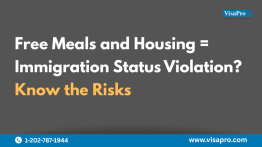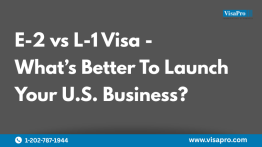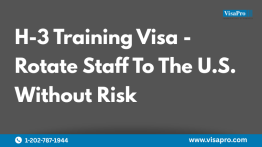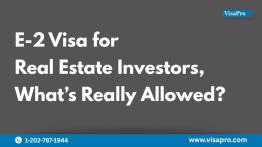Introduction
Setting up a business in USA can be quite exciting. But there are also many challenges. In-depth market research and planning can minimize the risks.
Foreign nationals starting a business in the U.S. face another daunting challenge – which visa should they obtain in order to legally enter the U.S. to run and operate the business once it has been established?
Let us consider the situations of Harry and Vijay detailed below:

My Case Scenario
Harry
Harry, a national of the UK, has been in the construction business with his father for several years. He has been watching the construction industry boom in the US and thinks it is a good time to get into business there. His father agrees and they start looking at various Cities. Atlanta, GA seems to be doing well and Harry takes a trip to check it out. His report back to his father is encouraging, and they begin work on setting up a company in the US. It is decided that Harry will come to the US to get the company up and running, and then direct the operations of the company.
What visa options are available to Harry?
My Case Scenario
Vijay
Vijay owns a very successful hotel in Hyderabad, India. He wants to open a long-term residence hotel in San Jose, California catering to Indian nationals on short term project assignments in the US. He thinks that he can capitalize on the cultural aspect and run a successful business. Vijay is planning to invest $400,000 in the US to get the hotel started.
What visa options are available to Vijay?
Starting A Business In The US As A Foreign National: What Visa Options Are Available?
The L1 visa can be used to start a new company in the US if it is a subsidiary, parent, branch, or affiliate of a foreign company. The E2 or E1 visa can be used to start a new business in the US if the foreign national applicant is from a country which shares certain treaties with the US.
Let us look at what these visa options are, and the situations under which each of these visa options can be used for starting a business in the United States.
A. New Office L1 Visa:
1. The L1 intra company transfer visa allows foreign nationals to enter the U.S. to open a new office of a foreign company, provided that premises for the U.S. office have been secured and funds have been invested in or available for U.S. operations.
2. To qualify for an L1 visa, the applicant must:
a. be an executive, a manager or an employee with specialized knowledge of the company’s business and its products and services, and
b. must have worked for the company overseas for one year in the three years before applying for the L1 visa
IMPORTANT
A qualifying relationship such as parent-subsidiary, branch or affiliate must exist between the foreign and the U.S. business entities.
B. E2 Visa:
- The E2 treaty investor visa allows foreign entrepreneurs from E2 treaty nations to enter into the U.S. for the purpose of directing and developing the operations of an enterprise they have invested in, or are in the process of investing, a substantial amount of capital.
- The investment must be significantly proportional to the total investment, that is, usually more than half the total value of the enterprise, or if it is a new business, an amount normally considered necessary to establish the business.
TIP
Investment activities can include the creation of a new business or purchase of an existing business.
C. E1 Visa:
- The E1 treaty trader visa allows nationals of an E1 treaty nation to enter the U.S. and carry out substantial trade
- The item of trade, and title of that item, must pass from one party to the other in exchange for consideration. The international trade between the home country and the U.S. must be ‘substantial’ in the sense that there is a sizable and continuing volume of trade
- More than 50 per cent of the international trade involved must be between the U.S. and the home country
DID YOU KNOW?
Trade means the international exchange of goods, services and technology.
10 Things To Consider When Choosing Between L1 Visa And E Visa
1. Country of Nationality
The E1 and E2 visas can be used only by citizens of countries that maintain a “treaty of commerce and navigation” or a “bilateral investment treaty” with the United States.
Additionally, the “nationality” of the US company must be at least 50% of the relevant treaty country, i.e. at least 50% of the US company must be owned by the foreign company or individuals who have the same nationality of the relevant foreign treaty company.
Note: Citizens of the United Kingdom are additionally required to prove domicile to be eligible for E visas.
TIP
If a multinational foreign company with a large number of shareholders from all over the world owns the U.S. company, it is a little more challenging to prove the actual nationality of the foreign company.

2. Nature of Investment
The E1 visa can be used by foreign entities that have not made a substantial investment in the U.S. but have substantial trade with the U.S. The substantiality of trade is determined by the volume of trade, number of transactions and the recurrence of these transactions.
The E2 investor visa can be used to starting a business in the US as a foreign national if the investment involved is substantial.
The L1 visa does not have a requirement of substantial investment in the U.S. (although it needs to be shown that the US company has enough capital or access to capital to run initial operations).
3. Employment With Foreign Company
To qualify for the New Office L1 visa, the foreign national must be an executive, manager or a specialized knowledge individual who has been an employee of the foreign company for at least one continuous year within the last three years.
There is no such requirement for the E1 or E2 visa.
DID YOU KNOW?
Qualifying treaty country nationals with no foreign employer intending to setup a business in the U.S. may not have much of a choice other than the E1 or E2 visa.
4. Qualifying Relationships
The L1 visa can be used to transfer an employee of a foreign company to setup, manage or work for a related organization in the U.S. irrespective of the employee’s nationality.
For E1 or E2 visa, the company or the individual engaging in trade or investment in the U.S. must have the same nationality as the treaty country.
DID YOU KNOW?
Though the principal E1 or E2 foreign national must possess the nationality of the treaty country, dependent spouse and children are not required to be nationals of the treaty country.
5. Processing Authority
E visa applications are generally filed with the embassy or consulate in the home country of the foreign national. Once the consulate registers the trading or investing enterprise for E visa purposes, the treaty national may apply for a visa to enter the U.S.
The L1 visa is generally a two-step process. A petition is first filed with the appropriate Service Center of the U.S. Citizenship and Immigration Services (USCIS). After the petition is approved, the applicant must apply for a visa at the consulate in the home country of the foreign national.
IMPORTANT
An applicant who is in the U.S. in lawful status may file a Change of Status petition with USCIS to E1 or E2 status. An applicant who does this, however, must still submit the entire application at the consulate if and when he or she departs the U.S. and need to re-enter in E status. The Consulate is not bound by the USCIS decision regarding the E1 or E2 application.An applicant that changed status to L1 in the U.S. has already completed first step, and needs to obtain the visa if and when he/she travels outside the country. The Consulate is generally bound by the decision made by USCIS.
NOTE: Canadians can apply for L-1 directly at the Port of Entry with Customs and Border Protection (CBP). CBP will adjudicate the petition and forward the application to USCIS for processing of the Form I-797 while the Canadian applicant enters the US under L1 status.
6. Processing Time
Even though E1 and E2 visa USA applications are processed directly at the U.S. embassy or consulate, the adjudication is complex and time consuming. It may take as long as three months for some consulates to fully adjudicate an E visa application, with practically no provision to expedite the process.
An L1 visa petition generally takes 2 to 3 weeks under premium process at the USCIS Service Centers.
DID YOU KNOW?
The adjudication of the E1 or E2 visa may take several weeks depending upon the consulate.L1 processing time at USCIS can be reduced to two weeks by utilizing their Premium Processing service.
7. Period of Initial Employment
E1 and E2 visas are generally granted for an initial period of 2 years, and can be renewed in increments of up to 5 years. They are admitted for a period of 2 years each time they seek admission into the US on a valid E1 or E2 visa.
L1 visas are granted for an initial period of 3 years (only 1 year for a new office), and can be renewed in increments of 2 years if the company can show that it has been doing business during the past year, and continues to require the services of the applicant as a manager, executive or an employee with specialized knowledge.
TIP
Companies that anticipate a “slower start” to get established in the U.S. may lean towards the E1 or E2 visa option that gives them a two year window to establish the operations.
8. Limit on Employment
An E1 or E2 visa can be extended indefinitely five years at a time provided that the stay of the applicant remains temporary.
An applicant in L1 status cannot extend L1 stay beyond 5 years (for specialized knowledge employees) or 7 years (for managers or executives).
DID YOU KNOW?
After an L1 employee spends one full year outside the U.S. they can start their L1 status again.
9. Intention of Obtaining A Green Card
The L1 may be the better route in cases where the intention of the applicant is to ultimately apply for a green card during his/her stay in the U.S. An L1 visa holder may pursue permanent residency and still maintain L1 status.
This may not be generally possible for E1 or E2 visa holders. Though E1 and E2 visas can be extended for an indefinite period of time, the applicant must maintain non-immigrant intent. Certain E2 investors may qualify for a Green Card under the EB5 category if they satisfy the job-creation and investment criteria (even through re-investments into the E2 business).
TIP
The permanent residency process may affect the applicant’s ability to maintain or extend E1 or E2 status. Applicants with long-term goals of remaining permanently in the U.S. should map out a strategy to achieve that goal.
10. Evidence Requirements
An E1 visa or E2 visa application entails extensive evidence requirements since the applicant needs to prove the substantiality of trade between the U.S. and the treaty nation, or the substantiality of investment in the U.S. Moreover, E visa applications are generally adjudicated at the Consulates, and there is no formal appeal or recourse to administrative or judicial review in the U.S. If the E1 or E2 visa is denied, the only recourse is convincing the consulate to reconsider the decision or re-submit the application with new evidence.
L1 visa applications for a start-up enterprise require evidence related to the business and revenues of the foreign company; the qualifying relationship between the foreign and the U.S. company; and a detailed business plan explaining the potential of the new company and its capability to meet business expenses, including the staffing requirements. Additionally, an adverse decision made by a USCIS Service Center can be reconsidered at various stages by the administrative and judicial machinery within the United States.
DID YOU KNOW?
The only recourse in the U.S. for visa denials is U.S. Department of State’s LegalNet. They only take up matters that clearly show that a Consulate applied the law incorrectly. The Consular Officers are given a wide degree of discretion.

My Case Scenario
Harry
Harry has 2 options available for him. He can use either the New Office L1A if the company is established as a branch, parent, subsidiary, or affiliate of the company in the UK. He has worked in management for over 1 year so he meets the basic requirements. The US and the UK have a qualifying treaty, so an E2 visa would be another option. To start the U.S. construction business, the UK company will invest a significant amount of capital, and they will hire a number of employees after winning the contracts. Harry and his father decided that the E2 investor visa is the best option for them – it gives them longer period to build the company to the level needed to support an executive.
My Case Scenario
Vijay
Vijay has only L1 option available because the US does not have a qualifying treaty with India. He is not concerned because his business plan is solid and he expects to have his residence hotel established to the extent where it will need his full-time executive oversight within one year. He is now looking for a competent manager to take over the operations of the hotel in Hyderabad.
Conclusion
Individuals from treaty countries have an advantage of choosing between E visa and L1 visa categories for setting up a business in USA as a foreign national. When different options are available, it is even more important to make a strategic and well-reasoned selection.
VisaPro offers end-to-end service in setting up a business in USA, and is able to work with you regardless of your physical location. VisaPro gives the right tools to companies expanding their operations into the United States
If you are deliberating over starting a business in the U.S., contact VisaPro today for a FREE Visa Assessment.
We’ll analyze and recommend a cost-effective strategy for your situation based on our tremendous success assisting foreign companies from over 50 countries around the world.
What VisaPro Customers Are Saying
Knowledgeable, fast, courteous, efficient are all words that describe the services I received from VisaPro. They were very helpful in all phases of the H-1B visa process and they got it right the first time. I have tried other Visa services, but VisaPro is the best by far. VisaPro is the only way to go!"

 Raymond Meyers, President, EBOZ, Inc
Raymond Meyers, President, EBOZ, Inc



